Sunday Morning Chat: American Manager Ricky Gutierrez
American Manager Ricky Gutierrez sat down with HSBN Editor Anthony Uttariello for a discussion that included his days in the major leagues, the success of his team this year and the moment he realized he was in love with the game. Enjoy!
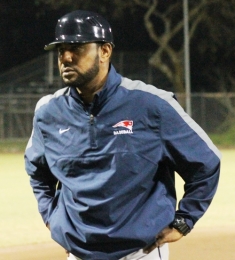 Anthony: Alright, let’s start off with giving the reader’s a little background into your career in baseball. Towards the end of your playing career, into coaching.
Anthony: Alright, let’s start off with giving the reader’s a little background into your career in baseball. Towards the end of your playing career, into coaching.
Coach Gutierrez: Okay. I played in the major leagues for 12 years. Teams I played for were San Diego, the Chicago Cubs, Houston Astros, in 2004 a little short stint with the New York Mets and I played in 2004 in the World Series with the Boston Red Sox. And then during that span I got injured. Neck fusion, I had during the 2003 season. I spent that whole year out of baseball and then coming back into the game, I wasn’t the same type of player after big time surgery. I finished rehab in 2004 and then I went to the minor leagues. I had an invite to the big leagues and they sent me to the Triple-A while I was trying to get back, you know. It wasn’t really working out, and you know when the writing’s on the wall, your skills are not there anymore, it’s time to probably come home and just be a father when your career is over. That’s something I did in 2006; I knew I wasn’t that same player. I wasn’t going to be able to help out a big league club anymore. So I made the decision to call it quits and retire.
When I came home I was kind of excited. I missed a lot of my kid’s life. I have four kids; A son named Eric, a daughter named Brittany, Ricky Jr. and Kendrick that I’m coaching now in high school. I missed a lot of their time so now I’m always at their sporting events and stuff like that. My son Kendrick was getting ready to go to high school and the situation came up with American, they kinda threw it at me, “Would you mind about starting coaching?” I never thought about it once I retired. I was like, “I don’t know. If the situation comes up, the right situation, I may do it.” And it happened that way. They needed a coach at American and I said “I’ll do it”.
Anthony: How hard was it to make the decision to walk away from playing, because most players don’t reach the level you were at, and most aren’t mature enough when the time comes to hang them up?
Coach Gutierrez: Well, I was the type of player that I never wanted to be that guy that was just hanging around. If I couldn’t help a team and produce, it was time to walk away. When I was in my prime I would tell my family, my wife, I would tell her that when the time came, and you see me dragging around trying to do something, that maybe it was time to turn the page and do something else, to let me know. I always had that in my mind. And once that situation came when I got hurt in 2003 and had that major surgery, I tried it two years in a row. And then that second year I was sitting in Triple-A, catching five o’clock in the morning flights and playing games the same day and I could feel myself getting closer and closer to getting back, but it was taking me too long, and it was time to say, “Hey Rick, you know what? I think it’s time for you to go home.”
Anthony: Last year I spoke to Coach (Bruce) Aven and I coached with Tony Fossas, two former big leaguers, and both of them seamed to bring a lot of what they learned at the major league level back. It was a different type of game with a different type of structure. Have you also taken that and tried to bring that down to the high school level or have you adjusted more to the way the high school game is played?
Coach Gutierrez: I try to. It’s hard. Today you probably will see a great, well played game with Heritage because he’s (Aven) a great coach too. But I’ve tried to do that. Bring everything I’ve learned in the game and try to bring it down to the high school level, respect your opponents, and just do things the right way. None of that bush league stuff.
Anthony: This really is the difference at this level.
Coach Gutierrez: No showing up your teammates. It’s ok to cheer for your team, but cheer for your team. Don’t get on the other team and laugh at them making an error. I see that a lot nowadays in high school. I’m just trying to get them prepared for if they do play in the college level or when they do get to that big level one-day, they’ll be prepared; because in college you can’t do that. You do some stuff like that, showing up your teammates, showing up the other club, and stuff like that, someone can get hurt.
Anthony: And then there is also a calmness that I’ve seen from the guys that come back from the major leagues and are in the dugout where they try to keep everything even keel. There’s not a lot of rah-rah stuff out of them. Is that something you try to bring back to your program?
Coach Gutierrez: I think that’s the part of how difficult it is to play this game. And the failures that we see, it’s hard for us to drill them because we did the same thing. We made errors and struck out. I think the thing that will get to us, when we get upset, is the mental errors, especially for the older kids. The physical errors and stuff like that, I can’t see myself jumping on the kids for just making a physical error or striking out, or tell them, “Why didn’t you swing at that ball?” cause I’ve been there. I’ve been through a long slump. I’ve been there and done that. I think that’s why you see the calmness and we’re more receptive to it because we’ve been there and done that.
Anthony: Moving to your team this year. You guys starting out playing very well this season. You currently (at time of interview) hold the top spot in our Miami-Dade Power Rankings and are starting to get notoriety for being one of the better teams around this year. Explain the reason for the hot start.
Coach Gutierrez: I think its chemistry. I think the last few years our team was young and now those young kids are juniors and seniors. The seniors are leaders and then my juniors follow my seniors and it’s just a trickle effect. And they’re a good group. They’re always together. They do things together. That goes a long way when you have a team that’s in school and you see them in lunch together, even after practice they go to each other’s houses, they hang out. You see that a lot on this team. It’s probably my first team I ever had where they are close. That goes a long way on the baseball field because they all have each other’s backs. If one fails, the other one picks them up. That’s been the biggest thing. And they’ve been playing great baseball. The all around game, defensively, pitching, and timing hitting, it’s been there for us right now. Baseball is a game of streaks momentum. One gets hot and they all run with it.
Anthony: Along those lines, coaches always have a feel of how good their teams are going to be starting in the summer and the fall. I know it’s early in the year, but are you even surprised a little bit with the success you guys have had so far or is this where you thought you would be at this point?
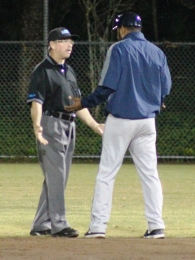 Coach Gutierrez: Surprised that we’re 8-0. Because we’ve never, I don’t think, we’ve never started out like this. In the fall I knew we had a good club, the way they played, when they would go out and play the game, I knew we had a good club. I tell everybody that we’ll be very exciting to watch this year. I didn’t have that prediction coming into the season, you tell me these guys were going to be 8-0, I’d have said, “No, I don’t think so.” But they’ve done it. We’ve got to give them all the credit. They come out every day and play the game hard for two and a half hours or three hours, whatever it is. I just tell them to take each game by game and respect your opponent. Whoever you play that day, respect them and just go play hard.
Coach Gutierrez: Surprised that we’re 8-0. Because we’ve never, I don’t think, we’ve never started out like this. In the fall I knew we had a good club, the way they played, when they would go out and play the game, I knew we had a good club. I tell everybody that we’ll be very exciting to watch this year. I didn’t have that prediction coming into the season, you tell me these guys were going to be 8-0, I’d have said, “No, I don’t think so.” But they’ve done it. We’ve got to give them all the credit. They come out every day and play the game hard for two and a half hours or three hours, whatever it is. I just tell them to take each game by game and respect your opponent. Whoever you play that day, respect them and just go play hard.
Anthony: American’s a program that has had some success. You guys were state runners-up in 2010. You guys have a history of winning. Why is it that American is not mentioned more when people talk about the power-house programs in Miami?
Coach Gutierrez: I don’t know. That’s a good question. Maybe I think that 2010 year was a surprise for everybody and it caught everybody by shock. In those seniors’ junior year we lost in regionals, and last year we had a bad season so I guess people want… that’s a tough question. I think it’s a good program. We have a lot of kids that go to college. We’ve got kids that have gone on to big leagues out of here. It’s just something where they’ll be recognized if they keep winning. That’s what I tell them. If you guys want to be recognized with the major teams with the Columbus’ and the Heritage’s and the McCarthy’s, you have to win. And that’s what everyone wants to see.
Anthony: Some coaches are disciplinarians, some are player’s coaches, others fall somewhere in the middle. If I asked your players to describe your coaching style, what do you think their answer would be?
Coach Gutierrez: They might say I’m a player’s coach. I’m a coach, but they can always come up to me and talk to me about other stuff and I’m here to listen. I’m not that coach where they’re afraid to ask questions. I have fun. They’re kids. I want to make their high school experience fun and memorable where they remember the good times, and not be a stickler. You have to be tough to a certain extent with them because they’ll take advantage of you, but, they know I like to have fun too. When it’s time to take care of business, we have to take care of business.
Anthony: You’re widely considered one of the best coaches in South Florida by your peers. Do you think that your major league experience helps you, or do you think that your people-skills help you more in coaching?
Coach Gutierrez: I think my major league skills helped me a lot because at the end of my career I became a utility player so in my mind I had to always be ready and think like a manager; to know when I had to be ready for him. That helped me a great deal. Being at the end of my career, sitting in the dugout, and me watching the game, and thinking as a manager like, “ok, maybe in this situation I might need to start getting loose, switch something here, you may do this, you may do that. So once I retired and I stepped into high school coaching I was ok with it, because in my baseball career I was already being a manager by just being a utility player. I had to think like the manager and what the manager was thinking at that time.
Anthony: So it’s almost like where they say that catchers tend to make really good…
Coach Gutierrez: Yes, exactly. Utility players sit on a bench and pick the manager’s brain because eventually you’re going to have to get ready, they got a righty coming up, or this guy makes the last out, and we need a double switch. You’re sitting in the dugout and you’re like another manager playing out the situations in your head.
Anthony: And how does it make you feel, I mean it’s a cut-throat business coaching, and there are a lot of battles that go back and forth between coaches. How does it make you feel to know that you are one of the guys that people look at and say, “Man, that guy does a good job?”
Coach Gutierrez: It feels good. I try not to, I’m the type of coach, I’m a friendly guy, I try to get along with everybody. My pet peeve is you play the game the right way. I’ve had people say before, “Ah, he’s too serious. He thinks this is the big leagues.” It’s not that, it’s just that I’m trying to teach the way I was taught in high school. When we played high school in my time, we competed but we played the game the right way. We didn’t disrespect each other and all the rah-rah talk, and home run trots where you’re looking at the ball and stuff like that. My team, we don’t get into that. I try to teach them to play the game the right way because if you continue playing this game, it’s going to help you in the long run. Because if you go to college, you’re not going to be able to do something like that.
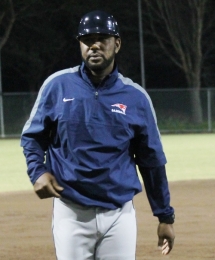 Anthony: I always talk to coaches that played the game themselves at a higher level. And when I was coaching, I always had a problem with this, but how hard is it to coach to your talent and not to your own abilities as a player? How difficult is that for you and how do you separate the two?
Anthony: I always talk to coaches that played the game themselves at a higher level. And when I was coaching, I always had a problem with this, but how hard is it to coach to your talent and not to your own abilities as a player? How difficult is that for you and how do you separate the two?
Coach Gutierrez: Yeah, it’s tough because that’s one thing I had issues with when I first started out. I thought they knew what I knew and I struggled with that the first few years. I would get upset sometimes with them because I would think they would know. But I had to take a step back and say, “You know what Rick? You have to teach. And they don’t know this stuff. You can’t assume that they know the stuff you know.” So I had to break things down and go back to basics and talk to them instead of getting upset with them, and it’s worked out for me. This club here, they soak a lot of stuff in and we practice every day. They practice hard and they understand and they ask questions and that’s how you learn.
Anthony: And for me, the toughest thing was the instincts because by the time you get a player to go, it’s too late for him, but if you would’ve gone two seconds earlier.
Coach Gutierrez: That happens a lot and all you can tell them is they have to pay attention. That’s what I tell them. When you’re playing defense, you have to talk to yourself. Just so you won’t be caught by surprise say it in your head, if this ball’s is hit to me, what would I do with it? Or if you’re hitting, or if you’re on deck, watch what the pitcher is doing to the guys in front of you. Or if you’re sitting on a bench not playing that day, just because you’re not playing don’t mean you can’t get in the game. I try to stress that to them. When you’re wearing this uniform, at any point in time your name might be called, so be ready. Pay attention. Nowadays you see kids that don’t play; they really don’t want to pay attention to the game. They’re playing around and kidding around and doing stuff. You always have to be ready because you never know.
Anthony: Baseball, more than any other sport, brings unbelievable passion out of fans. We all had those moments as kids where we fell in love with the game, whether it was through major leagues, a coach we had when we were young, or a moment we had on the diamond. For you, what was that moment that you realized that you were in love with the game of baseball?
Coach Gutierrez: My brother played the game. My dad played baseball in Cuba. My brother played in the Baltimore organization; he made it up to Triple-A. So the bloodline was already in me. When I grew up, I think I was already playing at an academy at five years old. You wouldn’t see me without a bat in my hand or outside throwing a ball. It was in me. I loved the game. I understood what I wanted to do from day-one. It’s all I dreamed of was just one day being in the big leagues. The guy I looked at was Ozzie Smith. Every game that was on TV, I always watched, I always charted it, I was just crazy about the game.
Anthony: And how much does that passion change? Because I know our generation tends to say, “These guys have the video games and they have other stuff”, but is that reality, or is that just generation after generation thinking the younger generation is not loving the game as much as they did?
Coach Gutierrez: I think they love it, but like you said, they have more distractions, the video games, the phones, the computers, it all distracts them. I think when they’re here, they love to play, but they are not like me when I would leave high school practice and go home and still be thinking about baseball. They leave the field and they’re done and they wait until the next day. I think that’s the difference. It’s not a twenty-four hour thing.
Anthony: Outside of baseball, what was your proudest moment, and why?
Coach Gutierrez: My proudest moment was marrying my wife. Her maiden name was Lisa Jones. She also went to American High, and having my kids. My four kids; Eric Gutierrez, Brittany Gutierrez, Rick Gutierrez Jr. and Kenny Gutierrez.
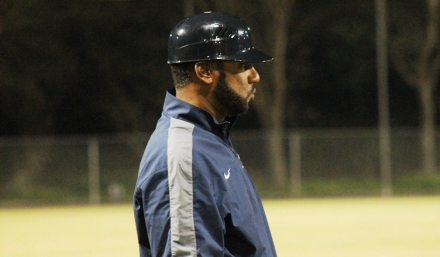 Anthony: Tell our readers, and maybe even the people within the American family, something they don’t know about Ricky Gutierrez.
Anthony: Tell our readers, and maybe even the people within the American family, something they don’t know about Ricky Gutierrez.
Coach Gutierrez: For people that don’t know me, I’m probably the most laid-back person you ever met. I’m not very controversial. They see me on the baseball field, they see me passionate and sometimes…everybody’s human. Sometimes things get out of control. Things happen during baseball and you get upset. People that know me, my close friends, they know what type of person I am. I’m a very caring person. If you’re my friend, you’re my friend for life. That’s something I don’t think a lot of people know about me.
Anthony: Down the road when you look back at your coaching career, what is the one thing you don’t want to have regret about?
Coach Gutierrez: Probably getting thrown out of the game. Disrespecting the game. There’s some games in high school, when you’re dealing with kids, and in my coaching career there are some things have happened in the past that I regret, and probably could have been done different.
Anthony: Does that just change as you get older?
Coach Gutierrez: Yeah. It does change. You change and become more mature and calmer and understand situations and you don’t let things like that bother you.
Anthony: Give me something good one of your players did during your coaching career not related to baseball that you just sat back and said, “Wow, that was amazing.”
Coach Gutierrez: The players that I’ve coached have gone on to graduate and come back and just thanked me and literally came up to me and said, “Coach if it wasn’t for you and everything you taught me…” and stuff like that. It’s gratifying when you have kids coming back after they’ve graduated from the program and appreciated what you did for them. It means a lot.
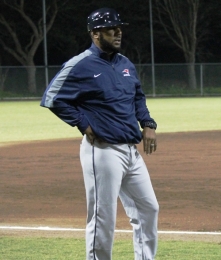 Anthony: Alright, let’s finish with a little game. I’ll give you a couple choices. You tell me which one you pick.
Anthony: Alright, let’s finish with a little game. I’ll give you a couple choices. You tell me which one you pick.
Coach Gutierrez: Okay.
Anthony: Dogs or cats?
Coach Gutierrez: Dogs
Anthony: Travel baseball or high school baseball?
Coach Gutierrez: High school
Anthony: Robert DeNiro or Al Pacino?
Coach Gutierrez: (laughing) I’ll take Al Pacino.
Anthony: A defensive double play or an offensive stolen base?
Coach Gutierrez: Oh. I like the defensive double play. I was a defensive guy.
Anthony: The long ball or the bunt?
Coach Gutierrez: Everybody loves the long ball. I’ll go long ball.
Anthony: Designated hitter or no designated hitter?
Coach Gutierrez: I like the DH because it makes the game more exciting. You know if a pitcher’s coming up to bat it’s an automatic out. Even if no DH makes it more interesting as a manager, I like the DH because it makes the game more exciting.
Anthony: Sunflower seeds or peanuts?
Coach Gutierrez: Sunflower seeds
Anthony: Alright, last one. State championship and a five-year coaching career or no state championship and a twenty-year coaching career?
Coach Gutierrez: (chuckling) I’ll take a state championship and a five-year coaching career.
Anthony: (laughing) Alright. Congrats on your team’s success so far, and good luck to you the rest of the season.
Coach Gutierrez: Thank you.









